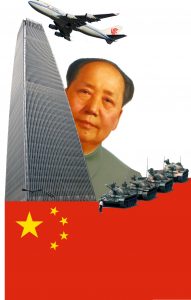Chinese ‘Marxism’: Not Even Trying

China has been run on supposedly Marxist lines for nearly seventy years, yet nowadays its rulers do little more than pay lip service to the idea that there is anything Marxist about the social system there. ‘Socialism with Chinese characteristics’ is the standard official description of the wages-prices-profits set-up that is really one form of capitalism.
The Chinese Communist Party (CCP) was founded in 1921. Last year at a conference held to mark its 95th anniversary, Xi Jinping, general secretary of the party’s Central Committee, gave a speech. Xi, who is also the country’s president, argued that Marxist principles had to be adapted to what was happening in China. ‘The changes in the times and the range and depth of China’s development are far beyond the imagination of classical Marxist writers,’ he said. Certainly Marx never envisaged socialism as a society with billionaires, or as one that protected the trademarks of multinational companies, but that is not what Xi had in mind.
According to the CCP’s constitution, the party is based on ‘Marxism-Leninism, Mao Zedong Thought, Deng Xiaoping Theory, the important thought of Three Represents and the Scientific Outlook on Development’. But as for what these actually mean, there is very little information. For instance, the Scientific Outlook on Development supposedly ‘puts people first and calls for comprehensive, balanced and sustainable development’, while ‘Mao Zedong Thought is Marxism-Leninism applied and developed in China’.
China’s constitution, adopted in 1982, states that there are no longer exploiting classes, but that class struggle will continue for some time. According to Article 6 there is socialist public ownership of the means of production, and the principle of ‘from each according to his ability, to each according to his work’ applies.
A 1988 amendment added that ‘The State permits the private sector of the economy to exist and develop within the limits prescribed by law.’ This was an official recognition of the growing influence of the non-state economy, with the establishment in effect of a mix of state and private capitalism (not stated in such terms, of course). In 1999 a further amendment accepted the existence of a variety of modes of distribution, so not just to each according to their work: again, no details, but perhaps an implicit acknowledgement that some people became very rich through exploiting others.
As for Deng Xiaoping Theory, this is the idea behind China opening up to the global economy and to the growth of private capitalism. Deng’s statement that ‘It doesn’t matter whether a cat is white or black, as long as it catches mice’ was a way of saying that economic success is more important than a politically correct policy. Xi Jinping is often seen as overseeing a return to ‘Communist orthodoxy’ compared to his predecessors as leader, but this does not go beyond platitudes such as ‘Marxism … does not end the truth, but opens the door and paves the way to reach the truth’.
In October 2015 a ‘World Marxist Congress’ took place in Beijing, intended to be the first in a series to be held every two years. Four hundred supposed Marxist scholars attended, many from outside China. Xin Xiangyang, described as ‘a research fellow on Marxism at the Chinese Academy of Social Sciences’ stated that ‘China faces an increasing number of problems in the midst of its economic slowdown and deepening reform, such as corruption and the growing income gap, which require the country to use Marxism to explain and solve them.’ Presumably these are unlikely to be explained as being part and parcel of capitalism.
Not everyone in China was impressed by the gathering. According to the WashingtonTimes (15 October 2015), some people suggested that Marxism be used to study the murderous Great Leap Forward and Cultural Revolution.
‘Marxism’ is taught in schools at all levels, but presumably this is just a Chinese version of Bolshevism. The rulers of China hardly even pretend that there is anything Marxist about the exploitative and unequal society they lord it over.
PB
